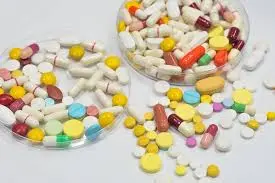Trazodone
Trazodone is indicated for the treatment of major depressive disorder (MDD). It has been used off-label for adjunct therapy in alcohol dependence, and off-label to treat anxiety and insomnia. It may also be used off-label to treat symptoms of dementia, Alzheimer’s disease, schizophrenia, eating disorders, and fibromyalgia due to its effects on various neurotransmitter receptors. Trazodone is a triazolopyridine derivative from serotonin receptor antagonists and reuptake inhibitors (SARIs) class of antidepressants. It is used by adults and has been shown to be comparable in efficacy to other drugs such as tricyclic antidepressants (TCAs), selective serotonin reuptake inhibitors (SSRI) and serotonin-norepinephrine receptor inhibitors (SNRIs) in the treatment of depression. A unique feature of this drug is that it does not promote the anxiety symptoms, sexual symptoms, or insomnia, which are commonly associated with SSRI and SNRI therapy. Trazodone acts on various receptors, including certain histamine, serotonin, and adrenergic receptors, distinguishing it from other antidepressants that cover a narrow range of neurotransmitters. It was initially granted FDA approval in 1981. Trazodone treats depressed mood and other depression-related symptoms and shows benefit in the treatment of insomnia due to its sedating effects. It is known to prolong the cardiac QT-interval. Memory, alertness, and cognition may be decreased by trazodone, especially in elderly patients, due to its central nervous system depressant effects.What is the mechanism of action of trazodone?
The mechanism of action of trazodone is not fully understood; however, it is known to inhibit the reuptake of serotonin and block both histamine and alpha-1-adrenergic receptors. Despite the fact that trazodone is frequently considered a selective serotonin reuptake inhibitor, several reports have shown that other mechanisms, including antagonism at serotonin 5-HT1a, 5-HT1c, and 5-HT2 receptor subtypes, may occur. The strongest antagonism of trazodone is reported to occur at the serotonin 5-HT21c receptors, preventing serotonin uptake. In addition to acting on serotonin receptors, trazodone has been shown to inhibit serotonin transporters. The antidepressant effects of trazodone result from the inhibition of receptor uptake, which normally decreases circulating neurotransmitters, contributing to depressive symptoms.What is the recommended dose of Trazodone?
For sleep problems, doctors typically prescribe low doses of trazodone, between 25 and 100 milligrams (mg). In this low-dose range, trazodone is thought to help encourage sleep while limiting the risk of daytime sleepiness.- As a treatment for depression, higher doses of trazodone (150-600 mg) are needed
- For treatment of aggression and agitation in Alzheimer’s disease patients, 50 mg of trazodone two times a day has been reported to be effective.
What happens when you take an overdose of Trazodone?
In contrast to tricyclics and monoamine oxidase inhibitor antidepressants, overdosing with trazodone is generally much less dangerous, especially when it is taken alone. Overdoses often involve multiple medications, and the other drugs may increase the risk of more serious complications. The combination of central nervous system depressants, such as alcohol and trazodone, can be lethal, and death is usually due to respiratory depression. Symptoms like coma (lack of responsiveness), Dizziness, Drowsiness, Headache, Insomnia, Seizures, Lack of coordination, Tremor, Chest pain, Irregular heartbeat, Low blood pressure, sometimes leading to fainting), Slow heart rate, and Difficulty breathing. Every potential overdose of Trazodone should be considered an emergency at the ER. The prescription a bottle of drug along with any extra drugs linked to the overdose should also be brought, as the data on the prescription label can help the treating physician estimate the quantity of pills consumed.What are the side effects associated with Trazodone administration?
Trazodone frequently causes sleepiness, headaches, nausea, indigestion, dry mouth, dizziness, and visual disturbances as adverse effects. Nausea and indigestion are more frequent at higher dosages and on an empty stomach. Taking trazodone with food may decrease gastrointestinal side effects. Patients may experience visual disturbances—seeing visual trails or afterimages when their eyes move. Generally, these side effects subside over time and are less frequent with lower dosages.What are the precautions taken when Trazodone is taken?
Do not use this medicine if you have taken an MAO inhibitor in the past 14 days. A dangerous drug interaction could occur. MAO inhibitors include isocarboxazid, linezolid, phenelzine, tranylcypromine, and others.- Some young people have thoughts about suicide when first taking an antidepressant. Your doctor will need to check your progress at regular visits while you are using trazodone. Your family or other caregivers should also be alert to changes in your mood or symptoms.
- Do not give this medicine to anyone younger than 18 years old without the advice of a doctor.
- Trazodone is not approved for use in children.
What is the effect of trazodone on pregnancy and lactation?
- Trazodone in pregnancy category C.
- Trazodone should not be given to nursing women since the drug will enter the breast milk and be consumed by the unborn child. Breastfeeding should not begin or should be stopped if quitting the medication is not an option.
What are the possible drug interactions with Trazodone?
Like many other drugs, trazodone is processed by the liver. When trazodone and other drugs are used together, there may be negative drug interactions because one medication may change the other’s blood levels. Other medications, including herbal supplements (such as St. John’s wort), that boost serotonin may result in excessive levels of that neurotransmitter when combined with trazodone. This may produce a toxic syndrome known as serotonin syndrome, which is caused by excessive serotonin stimulation. The early signs of serotonin syndrome are restlessness, confusion, tremors, flushing, excessive sweating, and involuntary muscle jerks. When Carbamazepine is combined with trazodone, Tegretol blood levels may be elevated, with a possible increase in side effects, and trazodone levels may be lowered, with a possible decrease in efficacy.- Cimetidine may inhibit the liver enzyme that metabolizes trazodone and produce elevated blood levels of trazodone, thus increasing the potential for adverse side effects from trazodone.




